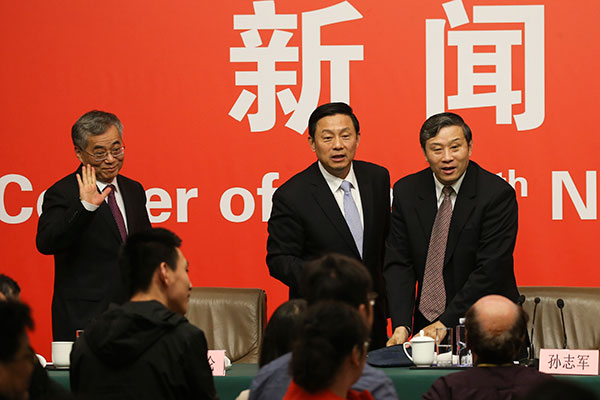Soft power as defined in Chinese:
约瑟夫·奈提出的概念
“软权力”概念的提出者的定义:它是一种“影响别人选择的能力,如有吸引力的、意识形态和制度”。事实上,软权力这个词语不仅适用于政治,更适用于商业和个人。约瑟夫·奈指出,有很多种影响他人行为的方式,既可以通过威胁和奖励他人,也可以通过吸引他人,来达到自己的目的。前者是运用“硬”,后者是施展“软权力”。“硬权力”指的是通常同诸如军事和经济力量那样的具体资源相关的“硬性命令式权力”,“软权力”指的是与诸如文化、意识形态和制度等抽象资源相关的、决定他人偏好的“软性同化式权力”。
中文名 软权力 提出者 约瑟夫·奈 来 源 树立鲜明的个性等 适用于 政治,更适用于商业和个人
There's more in the link that expands on details.
Also, publications about soft power from China:
() 10:47, October 21, 2017

Sun Zhijun (right), deputy head of the Publicity Department of the CPC Central Committee, and Xiang Zhaolun (left), vice-minister of culture, answer questions at a news conference at the 19th CPC National Congress on Friday. EDMOND TANG/CHINA DAILY
China has achieved greater soft power by developing its cultural industries and promoting international cooperation, while the country has signed more than 300 agreements with nations participating in the Belt and Road Initiative, high-ranking officials said on Friday.
Sun Zhijun, deputy head of the Publicity Department of the Communist Party of China Central Committee, was one of four officials who spoke at a news conference at the 19th National Congress of the CPC on Friday. He said the country's cultural soft power has substantially increased since the 18th CPC National Congress in 2012, making vital contributions to the promotion of the causes of the Party and the nation.
China ranks first in publications, production and broadcasting of television dramas, and movie screens, Sun said.
A survey released in August by the Pew Research Center, showed that China can compete with the United States to be a more favored nation. Sun said such surveys demonstrated that China's overall international influence is getting stronger.
According to the Ministry of Culture, China has signed agreements with 157 countries and regions. China has established 30 overseas cultural centers, attracting around 10 million visitors annually.

Xiang Zhaolun, vice-minister of culture, said China has signed more than 300 cooperative agreements and action plans on cultural exchanges with countries along the Belt and Road Initiative routes.
He said China has established multilateral mechanisms in cultural cooperation under the framework of the Shanghai Cooperation Organization, and through China's exchanges with Arabic and ASEAN countries.
"Belt and Road countries have long histories and are rich in cultural relics. We have worked with 15 countries in archaeological findings. Over the past few years, more than 1,000 relics had been displayed in over 20 of these countries," he said.
Zhang Hongsen, vice-minister of press, publication, radio, film and television, said China has signed agreements to make movies together with 20 countries, while the country has increasing exchanges in movies with the United States, as well as countries in Europe and Central Asia.
Soft power, consisting of attractiveness and influence, has been promoted by China's fast economic growth and increasingly competitive cultural industries in recent years, said Chen Shaofeng, vice-president of the Cultural Industry Research Institute at Peking University.
"Cultural centers, performances, popular TV series, movies and fast-growing internet businesses have made our country more attractive around the globe, especially in regions such as Southeast Asia," Chen said.
软权力
播报编辑 上传视频约瑟夫·奈提出的概念
“软权力”概念的提出者的定义:它是一种“影响别人选择的能力,如有吸引力的、意识形态和制度”。事实上,软权力这个词语不仅适用于政治,更适用于商业和个人。约瑟夫·奈指出,有很多种影响他人行为的方式,既可以通过威胁和奖励他人,也可以通过吸引他人,来达到自己的目的。前者是运用“硬”,后者是施展“软权力”。“硬权力”指的是通常同诸如军事和经济力量那样的具体资源相关的“硬性命令式权力”,“软权力”指的是与诸如文化、意识形态和制度等抽象资源相关的、决定他人偏好的“软性同化式权力”。
中文名 软权力 提出者 约瑟夫·奈 来 源 树立鲜明的个性等 适用于 政治,更适用于商业和个人
There's more in the link that expands on details.
Also, publications about soft power from China:
China boosts soft power
() 10:47, October 21, 2017

Sun Zhijun (right), deputy head of the Publicity Department of the CPC Central Committee, and Xiang Zhaolun (left), vice-minister of culture, answer questions at a news conference at the 19th CPC National Congress on Friday. EDMOND TANG/CHINA DAILY
China has achieved greater soft power by developing its cultural industries and promoting international cooperation, while the country has signed more than 300 agreements with nations participating in the Belt and Road Initiative, high-ranking officials said on Friday.
Sun Zhijun, deputy head of the Publicity Department of the Communist Party of China Central Committee, was one of four officials who spoke at a news conference at the 19th National Congress of the CPC on Friday. He said the country's cultural soft power has substantially increased since the 18th CPC National Congress in 2012, making vital contributions to the promotion of the causes of the Party and the nation.
China ranks first in publications, production and broadcasting of television dramas, and movie screens, Sun said.
A survey released in August by the Pew Research Center, showed that China can compete with the United States to be a more favored nation. Sun said such surveys demonstrated that China's overall international influence is getting stronger.
According to the Ministry of Culture, China has signed agreements with 157 countries and regions. China has established 30 overseas cultural centers, attracting around 10 million visitors annually.

Xiang Zhaolun, vice-minister of culture, said China has signed more than 300 cooperative agreements and action plans on cultural exchanges with countries along the Belt and Road Initiative routes.
He said China has established multilateral mechanisms in cultural cooperation under the framework of the Shanghai Cooperation Organization, and through China's exchanges with Arabic and ASEAN countries.
"Belt and Road countries have long histories and are rich in cultural relics. We have worked with 15 countries in archaeological findings. Over the past few years, more than 1,000 relics had been displayed in over 20 of these countries," he said.
Zhang Hongsen, vice-minister of press, publication, radio, film and television, said China has signed agreements to make movies together with 20 countries, while the country has increasing exchanges in movies with the United States, as well as countries in Europe and Central Asia.
Soft power, consisting of attractiveness and influence, has been promoted by China's fast economic growth and increasingly competitive cultural industries in recent years, said Chen Shaofeng, vice-president of the Cultural Industry Research Institute at Peking University.
"Cultural centers, performances, popular TV series, movies and fast-growing internet businesses have made our country more attractive around the globe, especially in regions such as Southeast Asia," Chen said.
